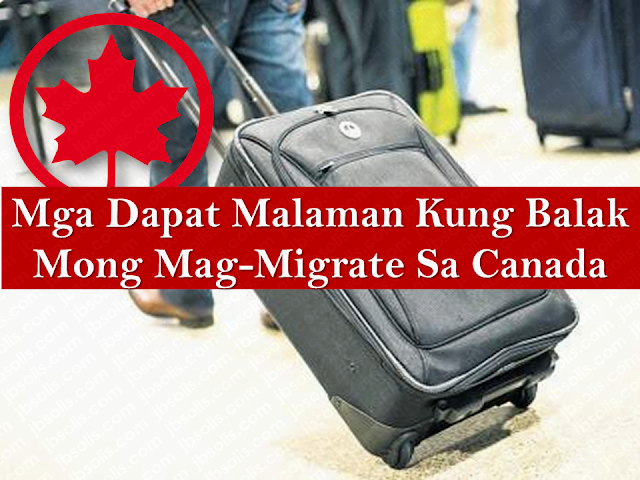Advertisements
Canada has always been a favored destination for people who wanted to experience a different set up, find a job and eventually bring their family with them. Being known for its natural beauty and high quality of life, Canada also offers one of the warmest welcomes in the world to immigrants — all reasons that make it a top target for Filipinos and people who are looking for a new work-and-life adventure.
The path to Canada could be made possible if you are a skilled worker, as it has criteria that expats must meet. This process made easier with the introduction of Express Entry, an immigration system that allows skilled workers to easily come into a Canadian career.
is used to manage applications for permanent Under Express Entry, there are three economic immigration programmes: the Federal Skilled Worker Programme, the Federal Skilled Trades Programme and the Canadian Experience Class.
Applicants complete an online profile — including details such as skills, work experience, languages and education — and are given a score out of 1,200. Those meeting the minimum Comprehensive Ranking Score are invited to apply for permanent residency.
Sponsored Links
Sponsored Links
There are several Canadian Immigration Visa categories you can apply to become a permanent resident of Canada:
Federal Skilled Worker (FSW)
Quebec Skilled Worker (QSW)
Provincial Nominee Programs (PNP)
Canadian Experience Class (CEC)
Federal Investor Class
Quebec Investor Class
Family Class Immigration
Temporary residency application is also available under the following categories:
Foreign students
Temporary foreign workers
Visitors
Immigration to Canada
Step 1: Protect Yourself From Fraud
Being vigilant and alert is vital to protect yourself from scammers who extort money by promising them assistance with the immigration process.
These frauds come in form of the following:
These frauds come in form of the following:
Internet scams
Email scams
Telephone scams
Marriage fraud
Citizenship fraud
Document fraud
Human trafficking
Step 2: Determine Your Eligibility
Sponsored Links
The right Canadian immigration program for you will depend on your qualities, your goals, and your particular situation. In order to find out if you are eligible to apply for immigration to Canada you will need to answer the following questions:
- What is your nationality?
- How old are you?
- What languages do you speak?
- What is your educational qualification?
- A few details about your family background.
- Do you have friends or relatives in Canada?
- What is your work experience?
- What is your current income or net worth?
- Do you have an offer letter from a company in Canada?
- Do you have a business that you own or manage?
Based on your answers, they will tell you what immigration programs you may be eligible to apply for.
Step 3: Apply for Immigration
After determining what immigration program you are eligible to apply for, the application process will begin.
All applications have a fee and once they are submitted to the IRCC they are evaluated on specific requirements and regulations. You may need to meet certain health and security requirements. For example, you may have to get a medical examination or undergo a background check to show if you have any criminal or civil cases in the past. IRCC may also want to interview you or see other documentation.
Step 4: Prepare For Life In Canada
You can start by acquiring a Driver’s License and ID card, getting your credentials assessed,carrying any required documents and finding a place to stay.
Permanent residents (PRs) and dependents can live, work and study in any of ten provinces or three territories.
Rights and duties
Education
PRs have the right to a free education up to the age of 18 in the Canadian public school system. University tuition fees are also reduced for permanent residents as compared to international students.
Healthcare
PRs qualify for provincial universal health care coverage from three months after their arrival. Most necessary medical expenses are covered.
PRs qualify for provincial universal health care coverage from three months after their arrival. Most necessary medical expenses are covered.
Tax
You must pay taxes at federal, provincial and municipal levels. Income tax is imposed on the basis of residency rather than citizenship. PRs are required to pay Canadian taxes on worldwide income. Assets of newly arriving immigrants are not taxed.
Canada Child Tax Benefit
Low-income families with children under 18 receive monthly government payments to help with expenses.
As immigrants in any country in the world, it is our duty to follow their laws and rules and to live in harmony with their citizen.
*Note: We are not endorsing any immigration consultancy and we are not in any way connected to any groups or entities offering visa assistance to Canada.
Low-income families with children under 18 receive monthly government payments to help with expenses.
As immigrants in any country in the world, it is our duty to follow their laws and rules and to live in harmony with their citizen.
*Note: We are not endorsing any immigration consultancy and we are not in any way connected to any groups or entities offering visa assistance to Canada.
Read More:
Popular Pinoy Stores In Canada
10 Reasons Why Filipinos Love Canada
Comparison Of Savings Account In The Philippines: Initial Deposit, Maintaining Balance And Interest Rates Per Annum
Mortgage Loan: What You Need To Know
Passport on Wheels (POW) of DFA Starts With 4 Buses To Process 2000 Applicants Daily
Jobs Abroad Bound For Korea For As Much As P60k Salary
Command Center For OFWs To Be Established Soon
©2018 THOUGHTSKOTO
SEARCH JBSOLIS, TYPE KEYWORDS and TITLE OF ARTICLE at the box below
